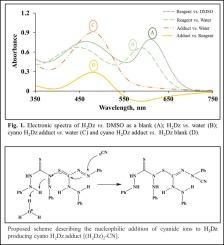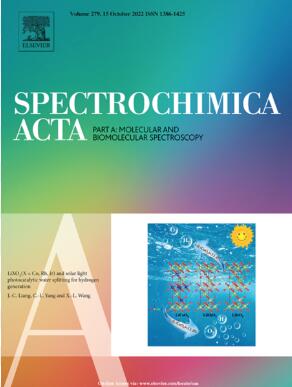微型双波长 β 校正分光光度计探针,通过形成氰基二硫腙加合物灵敏检测水中的氰化物
IF 4.3
2区 化学
Q1 SPECTROSCOPY
Spectrochimica Acta Part A: Molecular and Biomolecular Spectroscopy
Pub Date : 2024-10-20
DOI:10.1016/j.saa.2024.125314
引用次数: 0
摘要
水中的氰化物毒性严重威胁着公众健康和环境。为解决这一问题,我们建立了一种微型化、简单、低成本、选择性和灵敏度高的直接双波 β 校正分光光度法探针,用于检测水中的氰化物。双波长 β 校正分光光度法提高了探针在干扰物质存在时的选择性和灵敏度。在 pH 值为 6.8-7.2 的水介质中,氰离子与作为发色试剂的双硫腙(H2Dz)发生高选择性亲核加成反应,形成红色的氰基 H2Dz 加合物。所形成的加合物的电子能谱在 λmax = 480 nm 处显示出一个尖锐的吸收峰,可进行精确的比色检测。使用和不使用 β 校正分光光度法时,氰基 H2Dz 加合物的摩尔吸收率和桑德尔灵敏度指数分别为 5.62 × 103 和 1.79 × 103 L mol-1 cm-1,以及 0.002 和 0.0033 µg cm-2。比尔定律和林格峰图分别在 0.01-5.0 和 0.06-2.0 µg mL-1 CN- 浓度范围内有效。检测限(LOD)和定量限(LOQ)分别从普通分光光度法的 1.03 × 10-1 和 3.13 × 10-1 μg/mL 提高到β校正分光光度法的 2.8 × 10-2 和 8.7 × 10-2 μg mL-1。该探针反应迅速、抗干扰能力强、重现性好、成本效益高。该探针已成功应用于水中痕量氰离子的检测,并具有良好的重复性。在水样中也进行了验证,回收率良好(99.2 ± 5.02 %)。在 95 % 的概率下(n = 5),实验结果(texp = 1.2-1.5)低于临界值(texp = 2.78)。对氰基加合物的化学计量和形成机理进行了归纳和探讨。本文章由计算机程序翻译,如有差异,请以英文原文为准。

Miniaturized dual-wavelength β-correction spectrophotometric probe for sensitive detection of cyanide in water via formation of cyano dithizone adduct
Cyanide toxicity in water significantly threatens public health and the environment. To address this, a miniaturized simple, low-cost, selective and sensitive direct dual wave β-correction spectrophotometric probe has been established for cyanide detection in water. The dual-wavelength β-correction spectrophotometry enhances the selectivity and sensitivity of the probe in the presence of interfering species. The assay relies a highly selective nucleophilic addition of cyanide ions to dithizone (H2Dz) as chromogenic reagent in aqueous media of pH 6.8–7.2, forming a red-colored cyano H2Dz adduct. The electronic spectrum of the formed adduct displays a sharp absorption peak at λmax = 480 nm, enabling precise colorimetric detection. The molar absorptivity and Sandell’s sensitivity index for the cyano H2Dz adduct with and without β-correction spectrophotometry were 5.62 × 103, and 1.79 × 103 L mol−1 cm−1, and 0.002 and 0.0033 µg cm−2, respectively. Beer’s law and Ringbom’s plots are valid in the range 0.01–5.0 and 0.06–2.0 µg mL−1 CN– concentration, respectively. The limits of detection (LOD) and quantification (LOQ) improved from 1.03 × 10−1 and 3.13 × 10−1 μg/mL using ordinary spectrophotometry to 2.8 × 10−2 and 8.7 × 10−2 μg mL−1 employing β-correction spectrophotometry. The probe offers rapid response, good anti-interference ability, reproducibility, and cost-effectiveness. The probe was successfully applied for detection of trace levels of cyanide ions in water with good repeatability. It has been also validated in water samples with good recoveries (99.2 ± 5.02 %). The experimental Student t test (texp = 1.2–1.5) was lower than the critical (texp = 2.78) at 95 % probability (n = 5). The stoichiometry and mechanism of formation of the cyano adduct were assigned and addressed.
求助全文
通过发布文献求助,成功后即可免费获取论文全文。
去求助
来源期刊
CiteScore
8.40
自引率
11.40%
发文量
1364
审稿时长
40 days
期刊介绍:
Spectrochimica Acta, Part A: Molecular and Biomolecular Spectroscopy (SAA) is an interdisciplinary journal which spans from basic to applied aspects of optical spectroscopy in chemistry, medicine, biology, and materials science.
The journal publishes original scientific papers that feature high-quality spectroscopic data and analysis. From the broad range of optical spectroscopies, the emphasis is on electronic, vibrational or rotational spectra of molecules, rather than on spectroscopy based on magnetic moments.
Criteria for publication in SAA are novelty, uniqueness, and outstanding quality. Routine applications of spectroscopic techniques and computational methods are not appropriate.
Topics of particular interest of Spectrochimica Acta Part A include, but are not limited to:
Spectroscopy and dynamics of bioanalytical, biomedical, environmental, and atmospheric sciences,
Novel experimental techniques or instrumentation for molecular spectroscopy,
Novel theoretical and computational methods,
Novel applications in photochemistry and photobiology,
Novel interpretational approaches as well as advances in data analysis based on electronic or vibrational spectroscopy.

 求助内容:
求助内容: 应助结果提醒方式:
应助结果提醒方式:


